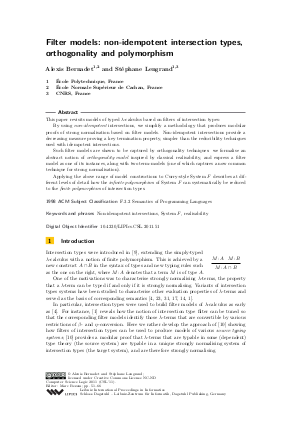Filter Models: Non-idempotent Intersection Types, Orthogonality and Polymorphism
Authors Alexis Bernadet, Stéphane Lengrand
-
Part of:
Volume:
Computer Science Logic (CSL'11) - 25th International Workshop/20th Annual Conference of the EACSL (CSL 2011)
Part of: Series: Leibniz International Proceedings in Informatics (LIPIcs)
Part of: Conference: Computer Science Logic (CSL) - License:
 Creative Commons Attribution-NonCommercial-NoDerivs 3.0 Unported license
Creative Commons Attribution-NonCommercial-NoDerivs 3.0 Unported license
- Publication Date: 2011-08-31
File

PDF
LIPIcs.CSL.2011.51.pdf
- Filesize: 0.53 MB
- 16 pages
Document Identifiers
Subject Classification
Keywords
- non-idempotent intersections
- System F
- realisability
Metrics
- Access Statistics
-
Total Accesses (updated on a weekly basis)
0Document
0Metadata
Abstract
This paper revisits models of typed lambda calculus based on filters of intersection types: By using non-idempotent intersections, we simplify a methodology that produces modular proofs of strong normalisation based on filter models. Building such a model for some type theory shows that typed terms can be typed with intersections only, and are therefore strongly normalising. Non-idempotent intersections provide a decreasing measure proving a key termination property, simpler than the reducibility techniques used with idempotent intersections. Such filter models are shown to be captured by orthogonality techniques: we formalise an abstract notion of orthogonality model inspired by classical realisability, and express a filter model as one of its instances, along with two term-models (one of which captures a now common technique for strong normalisation). Applying the above range of model constructions to Curry-style System F describes at different levels of detail how the infinite polymorphism of System F can systematically be reduced to the finite polymorphism of intersection types.
Cite As Get BibTex
Alexis Bernadet and Stéphane Lengrand. Filter Models: Non-idempotent Intersection Types, Orthogonality and Polymorphism. In Computer Science Logic (CSL'11) - 25th International Workshop/20th Annual Conference of the EACSL. Leibniz International Proceedings in Informatics (LIPIcs), Volume 12, pp. 51-66, Schloss Dagstuhl – Leibniz-Zentrum für Informatik (2011)
https://doi.org/10.4230/LIPIcs.CSL.2011.51
BibTex
@InProceedings{bernadet_et_al:LIPIcs.CSL.2011.51,
author = {Bernadet, Alexis and Lengrand, St\'{e}phane},
title = {{Filter Models: Non-idempotent Intersection Types, Orthogonality and Polymorphism}},
booktitle = {Computer Science Logic (CSL'11) - 25th International Workshop/20th Annual Conference of the EACSL},
pages = {51--66},
series = {Leibniz International Proceedings in Informatics (LIPIcs)},
ISBN = {978-3-939897-32-3},
ISSN = {1868-8969},
year = {2011},
volume = {12},
editor = {Bezem, Marc},
publisher = {Schloss Dagstuhl -- Leibniz-Zentrum f{\"u}r Informatik},
address = {Dagstuhl, Germany},
URL = {https://drops.dagstuhl.de/entities/document/10.4230/LIPIcs.CSL.2011.51},
URN = {urn:nbn:de:0030-drops-32226},
doi = {10.4230/LIPIcs.CSL.2011.51},
annote = {Keywords: non-idempotent intersections, System F, realisability}
}
